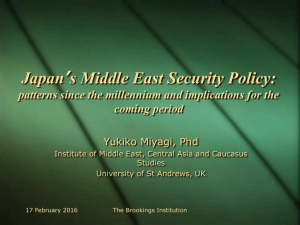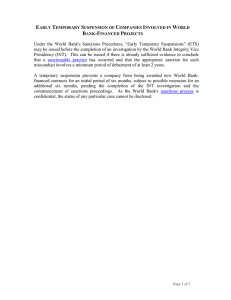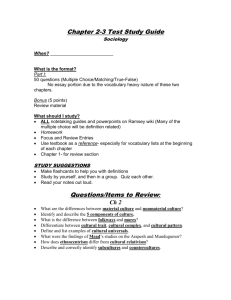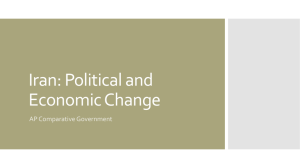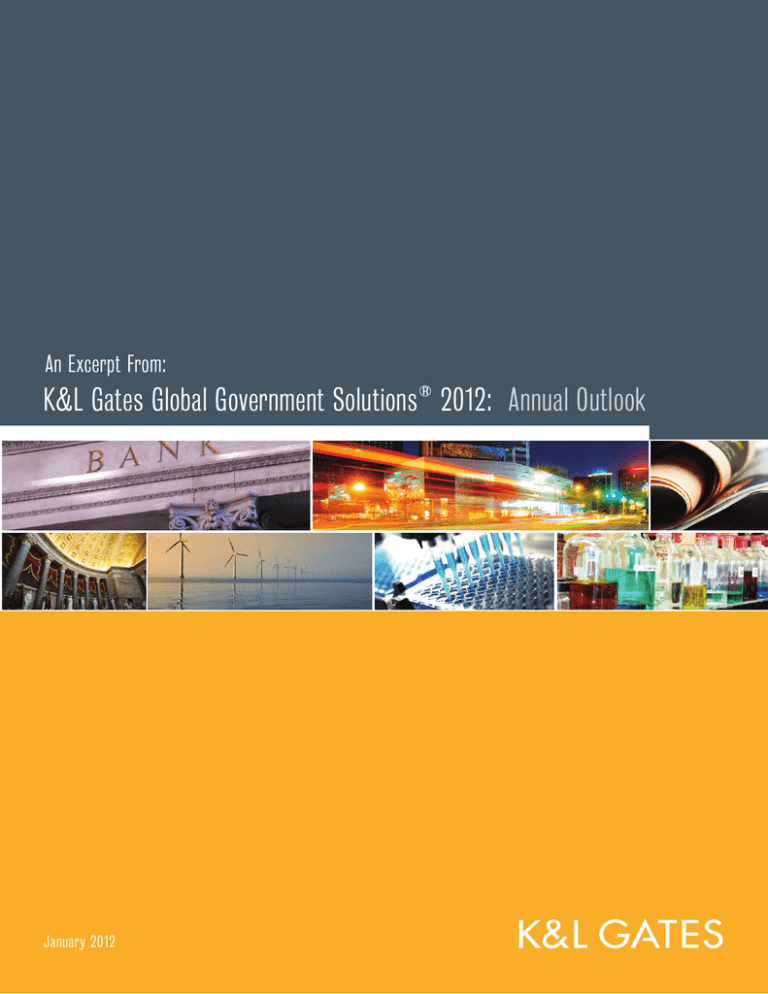
An Excerpt From:
K&L Gates Global Government Solutions ® 2012: Annual Outlook
January 2012
International Trade
An Update on the U.S. Iran Embargo:
A Proliferation of Anti-proliferation Measures
The past two years have brought about a sea change for the U.S. Iran embargo,
not only in terms of its scope and reach but also embargo mechanisms.
Viewed as a whole, two things stand
out about these developments. First, the
most recent changes have resulted in
an incredible proliferation of measures
potentially impacting transactions by
non-U.S. persons involving Iran. Indeed,
the assessment of whether a proposed
transaction may run afoul of, be impeded
by, or give rise to sanctions under
such measures may now, for certain
transactions, necessitate considering more
than a dozen separate U.S. regulations
and sanction regimes.
Second, even with the addition of a
multitude of new restrictions and possible
sanctions, the most obvious route for
applying economic pressure on Iran
appears to remain outside the scope
of the U.S. embargo. It appears that
non-U.S. persons still may purchase
Iranian petroleum without threat of U.S.
sanctions, although, as discussed below,
their ability to do so could be impeded
by newly passed U.S. legislation.
The Iranian Transactions Regulations
and the Iran Sanctions Act
After a hiatus following the resolution
of the embassy hostage crisis in 1981,
the current U.S. embargo on trade with
Iran began in 1995 with the issuance
of Executive Orders 12957 (March 15,
1995) and 12959 (May 6, 1995),
which, respectively, barred U.S. persons
from engaging in certain activities
relating to the development of petroleum
resources in Iran and imposed a virtual
embargo on trade by U.S. persons or
from the United States with Iran. The
executive orders were implemented
through the Iranian Transactions
Regulations (ITR), which are administered
34
by the U.S. Department of the Treasury,
Office of Foreign Assets Control (OFAC).
There also are provisions of the Export
Administration Regulations, not covered
in this article, which impose certain
restrictions on exports/reexports of U.S.origin products to Iran that operate in
combination with the ITR.
The following year, Congress passed the
Iran and Libya Sanctions Act of 1996
(ILSA), which authorized the President
to impose a variety of sanctions on any
person, including a non-U.S. person,
who invested $40 million or more for
the development of petroleum resources
in Iran (or, at that time, Libya). The ILSA
subsequently was amended to remove
Libya (after which it became the Iran
Sanctions Act (ISA) and to reduce the
threshold for sanctions to investments of
$20 million or more.
The ITR and ILSA formed the framework
for the U.S. embargo for the next 14
years—regulatory restrictions to bar
U.S. trade and the threat of sanctions to
discourage certain non-U.S. trade. The
ITR were rarely amended but vigorously
enforced. However, in the face of
objections by Western European trading
partners and allies, sanctions under the
ILSA were never imposed. And, neither
embargo measure specifically targeted
the supply by Iran of petroleum or
petroleum products to the world market
(except for certain restrictions applicable
to U.S. persons).
K&L Gates Global Government Solutions ® 2012 Annual Outlook
Expansion of the ISA
The Comprehensive Iran Sanctions,
Accountability, and Divestment Act
of 2010
In 2010, Congress adopted a
substantial amendment to the ISA, in
the form of the Comprehensive Iran
Sanctions, Accountability, and Divestment
Act of 2010 (CISADA). Signed into
law on July 1, 2010, the legislation
broadened the scope of activities
subject to sanction under the ISA. Most
significantly, the CISADA mandated
the imposition of sanctions against any
person engaged in the (i) sale, lease,
or provision of goods or services that
could directly and significantly facilitate
the maintenance or expansion of Iran’s
domestic production of refined petroleum
products; (ii) sale or provision of certain
refined petroleum products to Iran; or
(iii) provision of goods or services that
could directly and significantly contribute
to the enhancement of Iran’s ability to
import refined petroleum products. The
CISADA also added three categories of
sanctions to the original menu of six and
required the imposition of at least three.
More significantly, unlike the ISA prior
to July 2010, which spurred much
discussion but no actions, the U.S.
Government already has sanctioned at
least 10 entities in accordance with the
CISADA amendments.
Executive Order 13590
On November 21, 2011, President
Obama signed Executive Order 13590,
which extends the CISADA energy-related
sanctions to persons that knowingly
provide goods, services, technology, or
support to Iran that could directly and
significantly contribute to the maintenance
or enhancement of Iran’s ability to
International Trade
develop its petroleum resources or the
maintenance or expansion of Iran’s
domestic production of petrochemical
products. The Executive Order also
lowers the monetary thresholds that
will give rise to sanctions. Under the
executive order, transactions with a value
as low as $250,000 may create an
issue. However, as noted in the U.S.
Department of State fact sheet, dated
November 21, 2011, released in
conjunction with the Executive Order,
“[t]he Executive Order would not cover
the purchase of petroleum resources
or petroleum products from Iran, or the
shipping of those products from Iran,
absent other sanctionable conduct.”
Additional Regulations
In addition to the ITR, which, as
described above, impose general
restrictions on trade involving Iran, two
new regulations adopted by OFAC in
2010 and 2011 impose other more
specialized restrictions relating to Iran.
• T he Iranian Financial Sanctions
Regulations (IFSR), adopted on
August 16, 2010, which were
mandated by CISADA, generally
prohibit, or impose strict conditions
on, the opening or maintaining
of a correspondent or a payable
through account in the United
States for a non-U.S. financial
institution that knowingly facilitates
or provides support for certain
activities of the government of Iran,
including specifically for Iran’s
Revolutionary Guard Corps and the
Central Bank of Iran, and certain
other persons, including activities
relating to the acquisition or
development of weapons of mass
destruction or terrorism.
• The Iranian Human Rights Abuses
Sanctions Regulations, adopted
February 11, 2011, generally
block the property of and prohibit
U.S. persons from engaging in any
dealings with persons designated
for engaging in human rights
abuses in Iran. As with other
OFAC embargo regulations, the
designated individuals or entities are
included on OFAC’s list of Specially
Designated Nationals and Blocked
Persons (SDN List) and identified
with an acronym associated with the
OFAC regulations involved (in this
case, “IRAN-HR”).
Enforcement of Other Embargo
Regulations Against Iran
In addition to the restrictions under
the Iran-specific OFAC regulations,
individuals and entities in Iran also may
be designated on the SDN List under
sanctions regulations administered by
OFAC targeting other countries or certain
types of activities, such as relating to
terrorism, proliferation, or drug trafficking.
As a result, certain persons in Iran, in
addition to being within the scope of the
restrictions of the Iran-specific regulations
described above, also are designated
on the SDN List under one or more of the
following embargo regulations:
• Non-Proliferation Sanctions. The
Weapons of Mass Destruction Trade
Control Regulations, the Highly
Enriched Uranium Assets Control
Regulations, and the Weapons
of Mass Destruction Proliferators
Sanctions Regulations—persons
designated under these regulations
ordinarily are identified by the
acronym “NPWMD” on the SDN
List.
• Counter-Terrorism Sanctions.
The Global Terrorism Sanctions
Regulations, the Terrorism Sanctions
Regulations, the Terrorism
List Governments Sanctions
K&L Gates Global Government Solutions ® 2012 Annual Outlook
35
International Trade
Regulations, and the Foreign Terrorist
Organizations Sanctions
Regulations—persons designated
under these regulations ordinarily are
identified by the acronym “SDGT”
and/or “FTO” on the SDN List.
• Counter-Narcotics Trafficking
Sanctions. The Narcotics Trafficking
Sanctions Regulations and the
Foreign Narcotics Kingpin Sanctions
Regulations—persons designated
under these regulations ordinarily are
identified by the acronym “SDNTK”
on the SDN List.
• Iraq-Related Sanctions. The Iraq
Stabilization and Insurgency
Sanctions Regulations—we
understand that persons designated
under these regulations ordinarily are
identified by the acronym “IRAQ3”
on the SDN List.
• Syrian Sanctions. The Syrian
Sanctions Regulations—persons
designated under these regulations
ordinarily are identified by the
acronym “SYRIA” on the SDN List.
Anti-money Laundering
In addition to the banking-related measures
implemented through the IFSR, the U.S.
Department of the Treasury also has
implemented measures targeting Iranian
banks through the money laundering
provisions of the USA PATRIOT Act. Most
recently, on November 28, 2011, the
Treasury Department imposed a special
measure against the Islamic Republic of
Iran as a jurisdiction of primary money
laundering concern in accordance with
Section 311 of the USA PATRIOT Act. This
measure will make it more problematic
for even non-U.S. banks to engage in
dealings with Iranian banks.
Proliferation Sanctions
In addition to the proliferation-related
OFAC regulations and sanctions
administered under the ISA described
36
above, the U.S. Department of State
Bureau of International Security and
Nonproliferation (ISN), also administers
an anti-proliferation sanctions program
under a number of executive orders and
statutes, including the Iran and Syria
Nonproliferation Act; the Iran-Iraq Arms
Nonproliferation Act of 1992; the Iran,
North Korea, and Syria Nonproliferation
Act; and the Iran Nonproliferation Act of
2000. Many of the sanctions are similar
to those authorized under the ISA. A
number of Iranian persons are subject to
ISN sanctions.
Conclusion
The most recent U.S. efforts to bring a
comprehensive embargo to Iran clearly
have been motivated by the necessity to
prevent Iran from developing a nuclear
weapons capability. However, even
efforts born of a clear motivation and
objective are impacted by the context
in which they occur. The context in this
case is a highly politicized Washington
and an extended global economic
slowdown. The U.S. presidential election
is on the horizon, and Iran is a “hot
button” foreign policy issue. As a result,
the implementation of the Iran embargo
in the U.S. has become at least a bit like
the proverbial “battle of the bands,” with
the administration issuing successive new
Iran sanction regulations and Congress
passing successive new sanctions
legislation. That being said, given the
frailty of the U.S. and global economy,
neither seems inclined to pursue the most
aggressive course of seeking to cut off the
world from the supply of Iranian petroleum
and Iran from the revenue derived from
that supply.
As noted above, however, the ability
to purchase Iranian petroleum could
be severely hindered by the National
Defense Authorization Act for Fiscal Year
2012, which President Obama signed
on December 31, 2011. The legislation
authorizes the imposition of sanctions
K&L Gates Global Government Solutions ® 2012 Annual Outlook
on the Central Bank of Iran (CBI) and
directs the imposition of sanctions on
non-U.S. financial institutions engaged
in “significant financial transactions”
on or after February 29, 2012, with
the CBI or other Iranian financial
institutions designated by the Secretary
of the Treasury for the imposition of
sanctions. In addition, the legislation
mandates the imposition of sanctions
on non-U.S. financial institutions,
including central banks, in connection
with any transaction for the purchase of
petroleum or petroleum products from
Iran “conducted or facilitated” on or
after June 28, 2012; central banks and
other non-U.S. government owned or
controlled financial institutions also can
be targeted for transactions involving
sales of petroleum or petroleum products
to Iran. Specifically, the legislation,
which incorporates a national security
waiver applicable to all affected
transactions, as well as exceptions for
certain petroleum transactions designed
to avoid antagonizing countries allied
with the United States that continue
to purchase Iranian crude and to
mitigate against price shocks, directs
the president to prohibit the opening,
or prohibit or strictly condition the
maintaining, of correspondent or
payable-through accounts in the United
States by non-U.S. financial institutions.
Although it is unclear how the legislation
will be implemented, it has the potential
to severely limit the ability of non-U.S.
financial institutions to continue doing
business with the United States.
Jerome J. Zaucha (Washington, D.C.)
jerome.zaucha@klgates.com
Donald W. Smith (Washington, D.C.)
donald.smith@klgates.com
Daniel J. Gerkin (Washington, D.C.)
daniel.gerkin@klgates.com
Chase D. Kaniecki (Washington, D.C.)
chase.kaniecki@klgates.com
Anchorage Austin Beijing Berlin Boston Brussels Charleston Charlotte Chicago Dallas Doha Dubai Fort Worth Frankfurt Harrisburg
Hong Kong London Los Angeles Miami Moscow Newark New York Orange County Palo Alto Paris Pittsburgh Portland Raleigh
Research Triangle Park San Diego San Francisco São Paulo Seattle Shanghai Singapore Spokane Taipei Tokyo Warsaw Washington, D.C.
K&L Gates includes lawyers practicing out of 40 offices located in North America, Europe, Asia, South America,
and the Middle East, and represents numerous GLOBAL 500, FORTUNE 100, and FTSE 100 corporations, in
addition to growth and middle market companies, entrepreneurs, capital market participants and public sector
entities. For more information about K&L Gates or its locations and registrations, visit www.klgates.com.
This publication is for informational purposes and does not contain or convey legal advice. The information herein should not be used or relied upon in regard to
any particular facts or circumstances without first consulting a lawyer.
©2012 K&L Gates LLP. All Rights Reserved.



